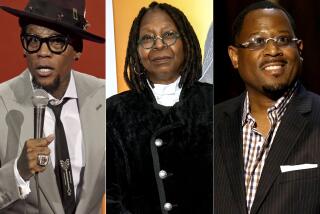W. F. Gibson, 69; Ousted as Head of the NAACP
- Share via
Dr. William F. Gibson, a civil rights leader whose tenure as chairman of the NAACP was marred by allegations that he spent the organization’s money lavishly and diverted some funds for his own use, has died. He was 69.
Gibson died Thursday in Greenville, S.C., where he lived. The cause of death was not announced.
Gibson, a dentist, headed South Carolina’s NAACP chapter for 18 years before being elected chairman of the national board in 1985.
“He had a passion for social justice,” the Rev. Jesse Jackson said. “No one in our state registered more voters and raised more issues of social justice than Dr. Gibson.”
Gibson’s term as chairman of the National Assn. for the Advancement of Colored People ended in 1995, the year he was accused of contributing to the group’s $3-million-plus deficit by abusing his expense account.
He was ousted by one vote and replaced by Myrlie Evers-Williams, the widow of Medgar Evers, a former NAACP official who was murdered in Mississippi in 1963.
Although Gibson said he could account for nearly all the $111,930 in question as NAACP business, his 10-year tenure was also hampered by complaints about a decline in corporate donations and membership.
Born in Darlington County, South Carolina, Gibson was the son of a brick mason and a schoolteacher. He became a dentist, and after interning at Harlem Hospital in New York, returned to his hometown of Greenville in 1959.
While attending a voter registration meeting at Springfield Baptist Church in 1961, he decided to devote his life to civil rights. He organized the Black Council for Progress, a group that helped boost blacks into local and state political offices during the 1970s.
Gibson’s commitment to voters’ rights continued through his 1985 election as NAACP national board chairman. “The ballot is the most important weapon we have,” he said.
Shortly after his election, Gibson told Jet magazine that the Reagan administration was “anti-black, anti-woman, anti-minority and anti-civil rights.”
He said the NAACP was “developing tactics and strategies to make certain that the Reagan-created court will not turn back the clock as it relates to blacks gaining their fair share in the public marketplace.”
Elaborating in an article for Crisis, an NAACP publication, Gibson wrote: “We are turning our political efforts toward our local communities and to Congress, where we continue to secure important victories for civil rights.”
According to Contemporary Black Biography, Gibson took the NAACP in a new direction during his tenure as chairman in the ‘80s and ‘90s. His agenda for the nation’s largest civil rights group was centered on the premise that it become more actively involved in the nation’s economy.
“The economic arena is where the game is being played now,” he told Jet. “That’s where the jobs are; that’s where the power is.”
Jackson said Gibson served others in his personal life as well, providing free dental care to people who couldn’t afford it.
“Gibson’s career represents a challenge to professionals who sometimes immerse themselves in their work and their pursuit of private success,” Jackson said. “Gibson was of the lineage that you became a professional so you could help more people.”
He is survived by his wife, Lottie, and four sons.
More to Read
Sign up for Essential California
The most important California stories and recommendations in your inbox every morning.
You may occasionally receive promotional content from the Los Angeles Times.










